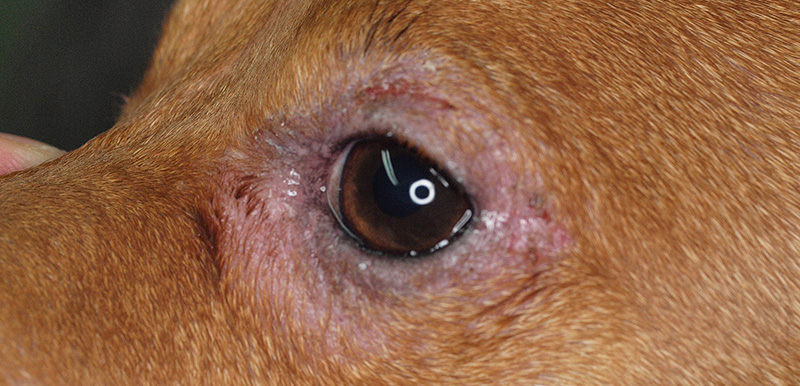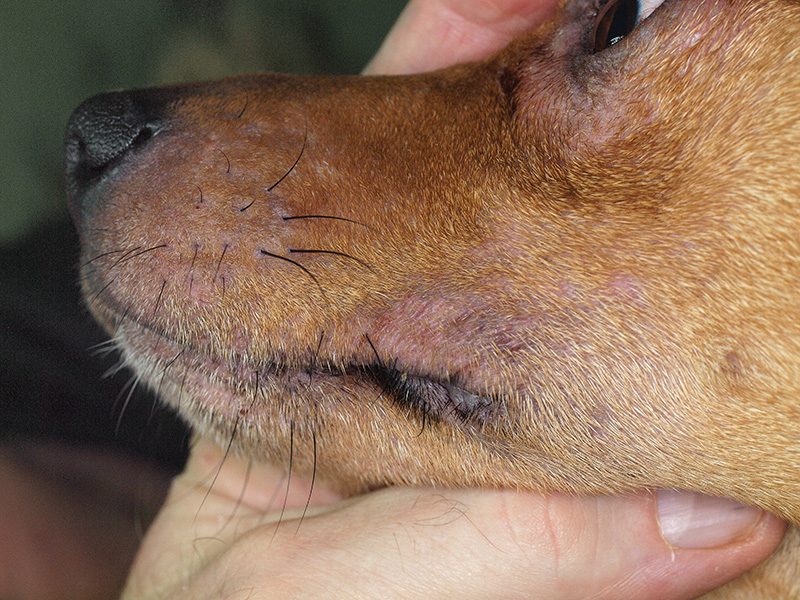Allergy Testing
The Diagnosis of Atopy
Atopy is usually diagnosed after a comprehensive allergy work-up. It is a diagnosis based on history, consistent clinical signs and ruling out other causes of itchy skin and/or otitis externa, such as food allergy in cases of perennial symptoms. Occasionally, non-atopic dogs and cats can have positive allergy test results – this is why it is vitally important that the correct diagnosis has been made first, before resorting to these tests, and why cases are best dealt with by a veterinary dermatologist or someone with a specific interest in veterinary dermatology.
The primary reason for performing allergy testing is to decide which allergens to use if trying Allergen-Specific Immunotherapy (ASIT). Despite the recent advances in treatment of allergic pruritus with monoclonal antibodies and JAK Inhibitors, ASIT is still the only treatment that can actually modify the animal’s immune responses and is always a therapy worth trying, particularly in cases of atopic otitis, as this condition doesn’t respond well to those two new treatments.
Two methods of allergy testing are used at the DermVet Referrals. Intradermal Skin Testing (IDST) is still considered the gold standard test among veterinary dermatologists and there is also the choice of serological allergy testing. These tests measure allergy in different ways – IDST measures allergen specific IgE bound to mast cells and the blood tests measures allergen specfic allergic IgE in the bloodstream. There are sometimes differences with the results of testing by these two different procedures, although the success rate of ASIT are similar. Many dermatologists are now doing both tests if finances allow, as there appears to be a slightly better response rate if the “positives” from both tests are included in the immunotherapy.

Intradermal Skin Testing – IDST
The test kit that I use contains 40 different indoor and outdoor allergens, including house dust mites, forage mites, grass, tree and weed pollens and moulds.
Before this test is performed animals should be taken off certain medications for various lengths of time as stated as below:-
- Antihistamines should be discontinued for 10 to 14 days.
- Injectable long-acting steroids should be discontinued 8 to 12 weeks prior to IDST.
- Oral steroids should be discontinued for at least 4 weeks.
- Topical steroids should be stopped 3 to 4 weeks depending on the strength of the steroid*.
- Essential fatty acids (fish oil/evening primrose/borage oil) should be discontinued for 10 to 14 days.
* This may not be neccessary if the steroid hydrocortisone aceponate (Cortavance) has been used, where the current recommendation is 2 weeks.
A very small quantity (0.05 ml) of each of the allergens and the control solutions is injected into the skin at various points – histamine is the positive control and the negative control is the solution that the allergens are contained in. After 15-20 minutes, all the injection sites are assessed to see if there has been any swelling and redness of the skin ( erythematous wheals). If a dog or cat is allergic to a particular substance, there will be an inflammatory response in the skin where it is injected and this will be seen as a swelling The size and degree of erythema of the wheals is compared with that of the control solutions, and this allows the animal’s allergies to be determined. The reactions we see in cats are much more muted that those seen in dogs and it takes a trained eye to see them – sometimes a fluorescent dye is injected intravenously and the injection sites examined with an ultraviolet light to evaluate the responses.
Serological Allergy Testing
Blood samples can be taken to measure the amount of allergen-specific IgE there is in the bloodstream. Blood testing, until a few years ago, was not considered very reliable as many symptomless, non-atopic dogs could give positive results. We are now using the revolutionary PAX test my Nextmune (previously Artuvet). This test is a molecular test, using the actual epitopes of the allergens concerned instead of crude allergen extracts. It also tests against 200 environmental allergens. Due to cross-reactivity and because the test is a molecular test, it is possible to reduce the number of allergens required in immunotherapy in cases with multiple positives using this test.
Results of ASIT based on these tests are nearly comparable ( see below) with those based on IDST. They have the advantage that, although it is still recommended that animals are off steroids for 4 weeks before testing, results can still be obtained from cases which are or steroids or have only recently come off them.
Since the advent of the PAX test, we have gained a lot of new knowledge, such as the fact that the half-life of IgE in serum is much shorter than the half-life of IgE fixed to mast cells in the skin. This can have implications for the timing of the test and highlights the likely need to do both tests if at all possible.
Candidates for allergy testing should be at least a year old and should ideally have gone through a full pollen season from the age of 6 months before testing. They should also have had food allergies ruled out by the use of a diet trial with an ultra-hydrolysed diet.
If an animal has both IDST and Serological Allergy testing performed, there can sometimes be a discrepancy with the results, and for the reasons mentioned above, a lot of dermatologists now recommend doing both these tests together, as choosing allergens for ASIT from the positive results of both tests may result in a better response rate. Also, I have had cases that were negative on IDST but positive on serological testing and vice-versa which have gone on to respond to immunotherapy.
Atopic-Like Dermatitis
Between 10-20% of dogs with non-flea, non-food allergic dermatitis with history and clinical signs which fit the diagnosis of atopy, have negative results both on PAX testing and IDST. This is similar to what is known as Intrinsic Excema in humans, Cases will respond to drugs such as Oclacitinib and Lokivetmab, but are not candidates, obviously, for immunotherapy.
If you would like to discuss your difficult skin or ear case with a dermatologist, or wish to refer an allergy case for intradermal skin testing, simply call us on 0116 3266759 or email us on referrals@dermvet.co.uk.

